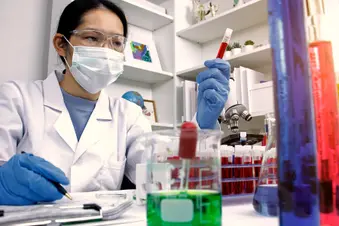
If you’ve noticed that you feel thirstier or hungrier than usual or other changes in your health, it might be a sign that you have prediabetes or type 2 diabetes. Tell your doctor if you notice any of these symptoms so you can be diagnosed and start treatment as soon as possible.
Type 2 Diabetes Symptoms
When blood sugar levels (also called blood glucose) start to rise, you might start to notice certain symptoms. These symptoms are a warning sign that your body is not using insulin the right way.
Symptoms of type 2 diabetes include:
- Fatigue
- Frequent urination
- Unexplained weight loss (even if you’re eating more)
- Thirstiness
- Blurry vision
- Headache
- Sweet breath
- Shortness of breath
- Palpitations
- Stomachache
- Nausea and vomiting
Other symptoms that might show up after some time include:
- Tingling or a pins and needles sensation
- Pain or numbness in the hands and feet
- Slow-healing cuts or bruises
- Bacterial or fungal infections
Many people don’t have symptoms when their blood sugar levels are high. Regular screenings are important for anyone who has a high risk of type 2 diabetes, even if they don’t have symptoms.
How Is Type 2 Diabetes Diagnosed?
To confirm a diagnosis of type 2 diabetes, your doctor has to run some blood tests.
These tests include the following:
- An A1c test, which measures your average blood sugar levels for the past 3 months.
- A fasting plasma glucose test, which measures your current blood sugar level. You can’t eat or drink anything except water for at least 8 hours before having the test.
- Random glucose test, which measures your current blood sugar level. Doctors use this test when they don’t want people with symptoms of diabetes to fast for a few hours before having the test.
Using a blood test, your doctor can diagnose whether you have diabetes, prediabetes, or gestational diabetes (if you’re pregnant).
Be Your Own Health Advocate
Remember that you are the most important member of your care team. This is why it’s important to keep medical specialists up to date about your needs, emotional state, and priorities.
Talk with your doctor to see which specialists should be part of your care team. Every member of your care team should be culturally competent. They should also be willing to take into account your preferences, needs, and values.
The support of a good care team is vital for the successful management of type 2 diabetes.
Here are some tips that newly diagnosed people find helpful:
Ask for a medical interpreter. It might be helpful to ask for a medical interpreter even if you speak English. A qualified interpreter can clearly explain in your own language the complex medical information your doctor is giving you. Remember, health care providers who get federal funding are legally required to offer you a medical interpreter and written material that’s been translated into your language.
Make an appointment with a registered dietitian or nutritionist. It’s a good idea to get guidance from a registered dietitian or nutritionist who has experience working with people who have diabetes. Your dietitian or nutritionist can give you helpful advice about eating with type 2 diabetes so you feel better. Eating well and exercising can help you:
- Keep blood glucose, blood pressure, and cholesterol levels in check
- Maintain a healthy weight or lose weight
- Prevent complications related to diabetes
- Feel good and have more energy
Join a support group. Ask for information about the various programs and support groups that can give you the tools you need to manage type 2 diabetes effectively. Some national organizations offer programs for people with diabetes. These programs can help you adopt new healthy habits that last a lifetime.
Talk with a diabetes care and education specialist. This is a health professional trained to offer personalized diabetes self-management education and support (DSMES) services. The DSMES can help you get knowledge and skills you need to manage the disease yourself. Ask your doctor for a referral.
Show Sources
Photo Credit: Moment/Getty Images
SOURCES:
American Diabetes Association: “Know the Early Symptoms of Diabetes.”
CDC: “Your Diabetes Care Team,” “Lifestyle Change Program Details.”
Environmental Protection Agency: “Assisting People with Limited English Proficiency.”
MedlinePlus: “Type 2 diabetes.”
National Institute of Diabetes and Digestive and Kidney Diseases: “Nutrition, Diet, and Physical Activity If You Have Diabetes,” “Diabetes Testing and Diagnosis,” “Type 2 Diabetes.”
Yale Medicine: “Prediabetes Is on the Rise – But It Can Be Reversed.”